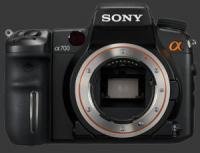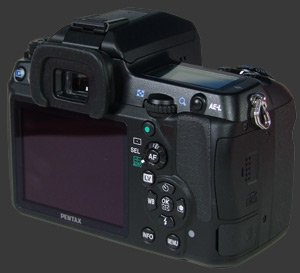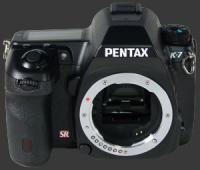Pentax K-7 Review
Pentax K-7 Performance - How well does it take pictures?
Ultimately, it is the image quality that makes a camera worth buying. For a digital SLR, image quality greatly depends on the lens used. While color, noise, contrast and exposure are properties of the camera, distortion, vignetting and chromatic aberrations are properties of the lens. Sharpness depends on the weakest link. So, the camera cannot capture more details than the lens lets through. Conversely, it is possible for a lens to transmit more details than the sensor can capture.
Exposure is good with the K-7, specially with subjects that fall within the camera's wide dynamic range. When a subject has more contrast than the K-7 can capture, it tends to overexpose by half a stop or so. This is the way to facilitate printing of unmodified images but for a more natural look, negative exposure-compensation may be needed.
The Pentax K-7 shows good hue accuracy but does not produce exact color saturation. Specifically, the neutral and bright settings are slightly under-saturated. The K-7 has six color modes plus one monochrome mode, each with a different starting point for color and tone. These modes can be modified to provide accurate colors and tonalities, with independent control over the tone-curve of highlights, midtones and shadows.

Sharpness is controlled in 9 steps along a standard, a fine scale or a second fine scale, when the firmaware version is 1.02 at least. The lowest setting is quite soft on either scale while the highest setting is reasonably sharp. Even at the highest setting, the Pentax K-7 does not over-sharpen by much. Both fine scales produce images with virtually no artifacts but not as sharp as the standard Sharpness scale. The new Fine 2 scale produces sharper images than the Fine scale.
Pentax has provided an excellent interface for setting image parameters. The most significant feature is a digital preview which is dynamically updated whenever an image parameter is changed. Another important detail is that the K-7 changes the color of any setting that is not at its default value to yellow. Settings at their default values are shown in green. The final touch is a 6-sided color space representation which shows how colors are affected by image parameters.
White-balance is rather complex with this digital SLR. Using custom white-balance, the K-7 achieves perfect color-balance. Preset white-balance either sets exact color temperatures or approximate ones, with the K-7 ultimately-deciding what color-balance to use. This is very accurate when it works but in extreme low-light the K-7 can get confused and produce way-off colors. The Automatic White-Balance setting works similarly with a custom setting to choose between subtle and strong correction. The strong correction produces very neutral results often but when it misses - usually in extremely low light - it can leave a strong bluish cast. On average, the K-7's white-balance system produces better colors than most DSLRs but when it does miss, it seems to be further off, at least with the approximate and strong correction enabled.
Noise levels are extremely low until ISO 400, very low but noticeable in shadow-areas at ISO 800 and low at ISO 1600. ISO 3200 is more noisy with chroma-noise being quite visible, still overall color-balance is neutral. Small prints at ISO 3200 should be possible. Noise at ISO 6400 destroys details, so this mode is only usable for the smallest prints. Overall, the Pentax K-7 is keeps up with modern DSLR in terms of noise but is better at keeping details. Most other cameras take the opposite approach and smooth-out both noise and details quite heavily. People who prefer the other approach can enable stronger noise-reduction through the custom setting menu.

In operation, the Pentax K-7 is speedy and responsive. There is rarely a moment where the photographer has to wait for the K-7. Startup, shutdown and shot-to-shot times are nearly instant. Image playback is also very fast. Live-view does have a short display lag though.
Focusing is fast and accurate, but not top-of-class. The fastest focusing camera tested here to date, the Sony Alpha A700
Sony Alpha A700 which focuses nearly instantly while the K-7 has a short-but-noticeable focus-lag. Continuous AF is not stellar either, with most high-end DSLR cameras being able to keep up with a moving subject better than the K-7.
The K-7 shoots continuously at 5.2 FPS or at 3 FPS. It does so very consistantly and quietly. Up to 40 frames can be taken at 5.2 FPS. At 3 FPS, shooting can keep up until the memory card gets full. Gone is the 20 FPS low resolution capture of the K20D. Movie mode would better serve this purpose as it is higher-resolution and higher-frame-rate.
Although there is no formal procedure for measuring the performance of image stabilization, we can say that the Shake Reduction system in the K-7 appears to be normally effective to at least 2 stops, with 3 stop of effectiveness hit-or-miss. Battery-life compares well to other modern DSLRs.
The digital level measures left-to-right tilt of the camera and shows it in 1 degree increments in the viewfinder and on the top status panel. This shows how tilted the picture is expected to be. If Horizon Correction is on, it does not show camera tilt less than one degree since it will be corrected. On the rear LCD, tilt is shown in 1/3 degree increments. When the tilt passes the point of correction, the indicator turns yellow. When the camera points upwards or downwards too much, the level can no longer records the tilt and displays 3 separate bars to indicate it is out-of-range. In practice, the digital level and horizon correction works rather well without being perfect when the vertical tilt is near the level's limit. Still, it greatly helps taking level photographs.
Pentax K-7 Performance - How well does it shoot video?
The Pentax K-7 is part of first wave of DSLR cameras which can record video. These are primarily still cameras and are designed as such. Photography comes first and video next. With that in mind, one can understand where the state-of-art of video-shooting DSLR cameras is.

This DSLR is particular because it allows shooting video at 1536x1024 resolution (3:2 aspect-ratio, just like photos from the K-7). This is not an HD resolution but the K-7 is also capable of shooting at 720p which is a 16:9 aspect-ratio standard HDTV format. The frame rate is set at 30 FPS. As expected from a DSLR, the quality of individual frames in videos from the K-7 is fantastic. Inter-frame compression is excellent since the K-7 uses M-JPEG (AVI) format for movies. This is much less space-efficient than other video-recording DSLR cameras which use H.264. On the other hand, video quality is higher with the K-7.
Videos from the K-7 appear very sharp with plenty of details, low noise and smooth motion. The advantage of a relatively large sensor gives optionally shallow-depth of field and the possibility of interchangeable lens gives a lot of flexibility. The downside is that a DSLR body and lens, designed with still images in mind, is harder to use as a video camera. The main issue is steadiness which is hard to acheive for more than a few seconds while holding the camera away from your body. Video cameras have electronic viewfinders (EVF) that keep the camera against your eye while shooting. This is not the case with a DSLR because video is implemented as part of live-view which shows on the rear LCD since there is no EVF on such cameras. Another side-effect of using live-view for video-recording is that autofocus must be performed before starting to record. Manual focus is available at all times and so is image stabilization.
Pentax K-7 Conclusion
The Pentax K-7 is a DSLR with an incredible feature-set, no other camera does everything this one does. Its wealth of features, many of them unique or uncommon, helps users take better pictures. The combination of automatic horizon correction, 100% viewfinder and built-in stabilization gives relief to the photographer, letting him compose and frame with greater ease.
Image quality is very good with generally low noise and high details. Color accuracy and white-balance are impressive and extremely flexible, as are image parameters for detailed control over the way images are captured. The K-7 is also a fast and responsive camera.
With so much going for it, one must consider what are the elements of highest importance because there are cameras which can best it in some aspects such as continuous drive, focusing speed and - for full-frame models - very low light performance.
The design and ergonomics of the Pentax K-7 are good but reflect compromises needed to make such a feature-rich camera relatively compact. Particularly, the LCD is too easy to leave marks on and the neck-strap gets in the way. The rest is well-thought out, with efficient and comfortable access to important functions.
The bottom line is that the Pentax K-7 is an excellent camera which has almost every feature available to a DSLR. It brings flexibility and superb image quality to a variety of subjects in a compact and well thought-out design.
 |
Please Support Neocamera
All information on Neocamera is provided free of charge yet running this website is a huge endeavor. Purchases made via affiliate links found throughout the site help keep it running and up-to-date. There is no additional cost to you, so please consider buying via these links to our affilates:
If you found any information on this site valuable and did not purchase via our affiliate links, please considering donating via PayPal:
Any amount will be greatly appreaciated. Thank you for your support!
Pentax K-7 Highlights

Sensor-Size: 24 x 16mm

Actual size when viewed at 100 DPI
| 15 Megapixels DSLR | ISO 100-6400 |
| Pentax K Mount 1.5X FLM | Shutter 1/8000-30s |
| 3-Axis Built-in Stabilization, 4-Stop Improvement | Full manual controls, including Manual Focus |
| 100% Coverage Large Viewfinder | Custom white-balance with 2 axis fine-tuning |
| Auto Horizon Correction 1 Axis Digital Level | Spot-Metering |
| Weatherproof down to -10C | Hot-Shoe & Sync-Port |
| Built-in Dust Reduction | Stereo audio input |
| 5.2 FPS Drive, 40 Images | Lithium-Ion Battery |
| 1536x1024 @ 30 FPS Video Recording | Secure Digital High Capacity |
| 3" LCD 920K Pixels |
Pentax K-7 vs K20D
In the K20D review, we compared it to the K10D which is internally a different camera but externally those models were nearly identical. Between the Pentax K-7 and K20D, the story is quite different. For a detailed description of design and feature differences between these two, see this Neocamera Blog entry.
What is left to discuss is performance. Briefly, there is a slight improvement in image noise but not enough to set the K-7 apart in terms of image quality. Continuous drive is much faster at 5.2 vs 2.8 FPS and probably the most significant performance improvement. Metering changed considerably. Both K-7 and K20D have good metering systems, the main difference is that when they do miss, the K-7 over-exposes while the K20D under-exposes.
Updates
2025.01.18

Fujifilm GFX 2025 Lens Roundup
Lens Review roundup of Fujifilm GFX Medium-Format lenses. Quality, performance and handling of the GF20-35mm F/4R WR, GF30mm F/3.5 Tilt-Shift and the GF55mm F/1.7.
2024.11.18

Best 2024 Photography Gifts for Every Budget
Great gifts for photographers and photo enthusiasts selected for every budget among the best products of 2024.
2024.08.07

Eye Protection Tips for Professional Photographers
The four main considerations for professional photographers regarding eyewear.
2024.07.14

Fujifilm X100VI Review
Flagship fixed-lens compact digital camera with a 40 MP sensor and Image-Stabilization, a first for the series. Retro design featuring dual control-dials, plus direct ISO, Shutter-Speed and EC dials. Its hybrid viewfinder can switch between EVF and OVF mode.
2024.05.09

Fujifilm GFX100 II Review
Flagship 102 Megapixels Medium-Format Mirrorless Digital Camera with 8-Stop 5-Axis IBIS, 8 FPS Drive, 8K Video and 400 MP Super-Resolution capture in a weatherproof and freezeproof body with dual control-dials and dual memory-card slots.
2024.04.03

Fujifilm X-T5 Review
Newest Fujifilm flagship boasting a 40 MP APS-C sensor, 5-axis IBIS with 7-stop efficiency, 15 FPS continuous drive, 6.2K Video capture, dual control-dials and dual SDXC UHS-II slots in a sturdy weatherproof and freezeproof body.
2023.11.20

Best Digital Cameras of 2023
Find out which are the Best Digital Cameras of 2023. All the new Mirrorless Digital Cameras from entry-level to high-end professional.
2023.07.10

Fujifilm X-H2 Review
40 Megapixels APS-C Hybrid Mirrorless Digital Camera with 7-stop IBIS. Fastest shutter ever and 8K video capture. Large builtin EVF with 0.8X magnification and 5.8 MP, plus an Eye-Start Sensor. Packed with features and large number of controls in a weatherproof and freezeproof body.
2023.05.07

Sony FE 20-70mm F/4G Review
Review of the unique Sony FE 20-70mm F/4G lens. The optical zoom of this lens spans ultra-wide-angle and medium focal-length coverage, making it one of the most versatile Full-Frame lenses on the market.
2023.01.15

Huion Inspiroy Dial 2 Review
Review of the Huion Inspiroy Dial 2 tablet, a medium sized drawing surface with dual dials and customizable buttons. Connects via USB-C or Bluetooth 5.0 with Windows, Linux and Android support.
2022.12.08

How to Pack for a Photo Trip
Find out how to pack for a travel photography trip, carry your gear safely while meeting airline regulations.
2022.11.13

Best Digital Cameras of 2022
The best digital cameras of 2022. A short list of the most outstanding models in their respective categories. Choose one for yourself or as a gift.











